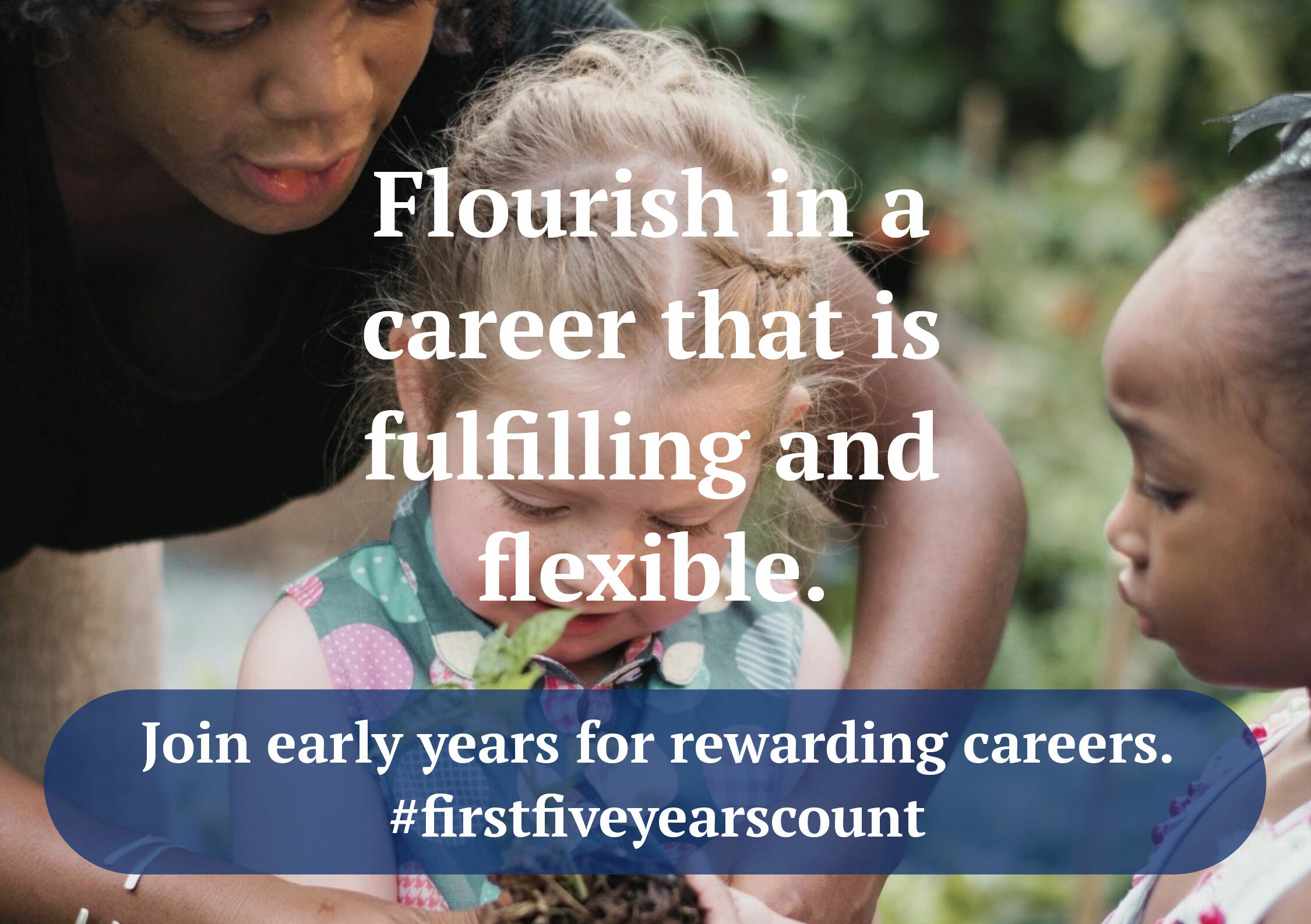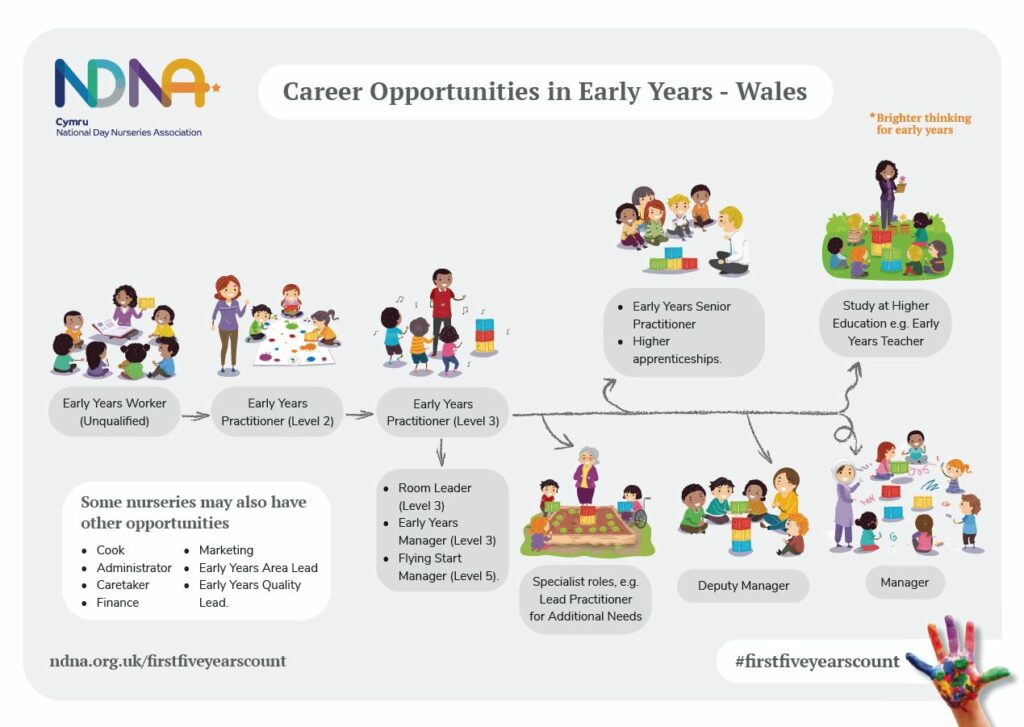Working with children in their earliest years is incredibly rewarding.
Approximately 90% of a child’s brain develops between the ages of 0 and 5 so a high-quality early education can be life-changing.
If you want to help make these first five years count, there are a number of ways to embark on a career in the early years sector. Find out everything you need to know about early years careers below.

If you enjoyed this video, please share to help spread the word on the impact of the early years sector.
Where do I start?
If you want to help make these first five years count, there are a number of ways to embark on a career in the early years sector, childcare and playwork, including:
- Applying for a role directly (with or without a qualification)
- A college course
- An apprenticeship
- Working towards this role though a school based qualification, e.g. Cam wrth Gam
- Volunteering.
Whether you have a formal qualification in early years, childcare and playwork or not, are lots of opportunities for new entrants, whether you enter directly from formal education or through a career change from a different sector, perhaps later in life.

Where will my career in early years take me?

Routes to qualifications in Wales
Whether you have a formal qualification in early years, childcare and playwork or not, are lots of opportunities for new entrants, whether you enter directly from formal education or through a career change from a different sector, perhaps later in life.
If you do enter the early years sector without a relevant qualification and you wish to progress your career in early years, there are options available to you. If you are not able to access programmes such as apprenticeships due to funding, you can apply directly to the nursery setting and they will be able to support you to get a qualification, whilst working.
Qualifications will give you a grounded understanding of how children develop and how positive interventions with children during their first five years help them to become lifelong learners and positive citizens.
Dependant on experience and prior qualifications, you could undertake Level 2 to Level 5 early years qualifications, an early years degree or higher apprenticeship and progress to room leader, deputy manager, manager or even a nursery ownership.
Qualifications in Wales
Below is a list of required of the qualifications to work in early years and childcare:
Roles available to me in early years
These include roles such as cook, admin staff, finance and unique sector specific roles, such as quality improvement or curriculum lead.
We have listed typical roles that you would find in almost all nursery settings below, alongside the qualifications required for these types of job.

Unqualified Practitioner

You can work in the early years, childcare and playwork sector without a qualification. You may have transferable knowledge and skills from previous work, experiences and learning. You could also work as a volunteer.
As an Unqualified Practitioner, you are likely to:
- Work under supervision with experienced practitioners
- Support experienced practitioners to provide care routines and deliver educational play opportunities/activities that enable children to explore and develop
- Provide support to children based on their needs and interact children from a variety of backgrounds
- Observe how each child learns differently, with your support, and how experienced practitioners structure play activities to ensure that learning opportunities are maximised.
As an unqualified practitioner, you will need shorter programmes of learning in areas such as Safeguarding, Food Hygiene, etc. Your employer may present the opportunity for you to take part in Paediatric First Aid training.
You will also be required to complete the All Wales Induction Framework for Early Years and Childcare.
If you wish to progress and work towards qualifications it is important that you make sure you select the right qualification. The Social Care Wales list of required qualifications outlines which qualifications are required for each role within the early years and childcare sector. The Playwork Education and Training Council (PETC) for Wales outlines which qualifications are required for each role within the playwork sector.
The approved lists of qualifications have been developed to help you to make the right choices. When speaking to either a college/training provider, an apprenticeship provider or a university ask them to confirm that the qualification they are offering will enable you to be counted as a qualified practitioner in a registered childcare setting in Wales. You can find the list of approved qualifications here:
Childcare and early years qualifications
Playworker
 To be recognised as a qualified Playworker you will need to hold at least a level 2 qualification from the required list of Playwork qualifications.
To be recognised as a qualified Playworker you will need to hold at least a level 2 qualification from the required list of Playwork qualifications.
You may be employed as a playworker within a childcare setting that offers afterschool or holiday provision.
As a qualified playworker at level 2, in this job you need:
- A belief that children are the experts when it comes to their play
- A good understanding of how to provide resources for play
- An awareness that risk taking is an important part of play and that the role of adults is to balance risk taking with the physical and emotional benefits
- To have a willingness to step back when necessary so children can play in their own way.
Play Wales have developed a guide that provides more information about the role of a playworker in Wales.
Early Years Assistant Practitioner
 To be recognised as a qualified Early Years assistant practitioner you will need to hold a level 2 qualification (or above) that is recognised on the list of required qualifications that is counted as full and relevant. You can find the list of approved qualifications here Childcare and early years qualifications.
To be recognised as a qualified Early Years assistant practitioner you will need to hold a level 2 qualification (or above) that is recognised on the list of required qualifications that is counted as full and relevant. You can find the list of approved qualifications here Childcare and early years qualifications.
When speaking to either a college/training provider or an apprenticeship provider ask them to confirm that the qualification they are offering will enable you to be counted as a qualified staff member within a registered childcare setting. A level 2 qualification provides the grounding for understanding how to work effectively with children.
As a qualified Practitioner at level 2, in this job you are likely to:
- Understand how to work effectively with children
- Work with room leaders and others to care for and teach small children
- Be involved in planning for children’s development and providing play activities that enable children to explore and develop
- Deal with different kinds of behaviours and requirements as each child is unique
- Have responsibility for some key children, observe how children are developing on a day to day basis, engage with parents at drop off and pick up and lead on some activities.
Early Years Practitioner
 To operate at this level you will need to hold a level 3 childcare and early years qualification or apprenticeship, recognised on the list of required qualifications that is counted as full and relevant. You can find the list of approved qualifications here:
To operate at this level you will need to hold a level 3 childcare and early years qualification or apprenticeship, recognised on the list of required qualifications that is counted as full and relevant. You can find the list of approved qualifications here:
Childcare and early years qualifications.
When speaking to either a college/training provider or an apprenticeship provider ask them to confirm that the qualification they are offering will enable you be counted as a qualified staff member within a registered childcare setting.
As an Early Years Practitioner at level 3, in this job you are likely to:
- Lead on children’s development as you will have more detailed knowledge and experience of children’s developmental stages
- Lead a room or become a manager across the whole setting should you successfully secure a position
- Have key responsibilities in addition to the level 2 role, e.g. liaising with external professionals and parents/carers in the best interests of the child
- Undertake observation and assessment of children and track their progress, and ensure that play opportunities provided support each individual child’s needs to enable children to explore and develop
- Plan for children’s learning experiences in line with the non-maintained curriculum for Wales
- For those working with children aged 3 to 4, the role might also include preparing children for transition to school
- Work with others, often as a supervisor, or even mentor new starters that join early years as a career such as apprentices.
Deputy Manager
 You will have at least a level 3 qualification in childcare and early years, recognised on the list of required qualifications that is counted as full and relevant. You can find the list of approved qualifications here Childcare and early years qualifications.
You will have at least a level 3 qualification in childcare and early years, recognised on the list of required qualifications that is counted as full and relevant. You can find the list of approved qualifications here Childcare and early years qualifications.
In the role of Deputy Manager you are likely to:
- Supporting the Manager to provide inclusive play and learning opportunities for all children attending the setting
- Maintain a safe, stimulating and enjoyable environment
- Assist the Manager with tasks such as maintaining staffing levels and monitoring financial performance in the Manager’s absence
- Support the Manager in ensuring the staff are committed to safeguarding and promoting the welfare of children and young people in the setting
- Act as safeguarding lead in the absence of the Manager, following the prescribed policy and procedures
- Oversee the planning, delivery and monitoring of the early years curriculum in accordance with the children’s learning and developmental needs
- Support the Manager to ensure the setting is actively engaged in continuous quality improvement
- Manage other staff on a daily basis as directed by the Manager – including supervising volunteers, students and apprentices on work placement or work experience. You could act as a mentor ensuring new staff are aware of the operational policies and procedures including how to implement and access them.
Manager
 You will have at least a level 3 qualification from the approved list and should also have two years post-qualification experience in working in childcare and early years. You can find the list of approved qualifications here Childcare and early years qualifications. If your setting also runs afterschool or holiday provision you will also be required to hold a level 3 qualification from the list of required Playwork qualifications.
You will have at least a level 3 qualification from the approved list and should also have two years post-qualification experience in working in childcare and early years. You can find the list of approved qualifications here Childcare and early years qualifications. If your setting also runs afterschool or holiday provision you will also be required to hold a level 3 qualification from the list of required Playwork qualifications.
The manager (or leader) of a Flying Start setting will usually also be the “person in charge” and will directly manage the setting. To operate at this level you will need to hold a level 4 or 5 qualification from the list of required qualifications. You can find the list of approved qualifications here Flying start qualification requirements.
The manager will be the person responsible for setting the operational direction and organising the effective running of the day care provision. The manager will normally be the “person in charge” and may be the “registered person” (namely the registered childminder or registered provider of day care) is ultimately responsible for ensuring compliance with the regulations, having regard to the relevant National Minimum Standards.
It is important that you demonstrate a sound understanding of child development and children’s needs with an ability to plan and provide suitable opportunities and experiences to support children’s individual needs and development.
You must be committed and lead the staff team to safeguard and promote the welfare of children and young people. It is your responsibility to ensure all staff share this commitment and follow the prescribed policy and procedures to promote a culture of safeguarding continuously within your setting.
In the role of a Manager you are likely to:
- Set a clear and ambitious vision for the setting for providing high-quality, inclusive care and education to all. This is realised through strong shared values, policies and practice
- Take the lead responsibility for the implementation of the settings agreed business plan for the management of people, resources and all paperwork
- Ensure record keeping meets the required standard, including recording progress and achievement
- Liaise with a range of visiting specialists, such as speech and language therapists or the Early Years Additional Learning Needs Lead Officer (EY ALNLOs)
- Develop partnerships with parents, carers and guardians signposting appropriately to meet the needs of the family
- Lead the provision of early years education and childcare to agreed quality standards, reflecting the requirements of the;
- Curriculum for Wales. The Welsh Government have developed a curriculum for funded non-maintained nursery settings to adopt that complies with the requirements of Curriculum for Wales. The curriculum for funded non-maintained nursery settings can be viewed here: https://hwb.gov.wales/curriculum-for-wales/curriculum-for-funded-non-maintained-nursery-settings
- Care Inspectorate Wales (CIW) – CIW are the independent regulator of social care and childcare. They register, inspect and take action to improve the quality and safety of services.
- Estyn – Estyn jointly inspect (with CIW) childcare providers which are funded by their local authority to deliver early years education.
- Child protection and safeguarding legislation e.g. Wales Safeguarding Procedures
- Childcare Act
- Equality Act
- Health & Safety regulations and all other relevant legislation
- Take the lead in inspections
- Manage staff on a day-day basis and carry out appraisals and target setting with your staff
- Ensure that you and practitioners receive focused and highly effective professional development.
Managers in more senior positions may also have responsibilities for a number of early years and education sites across the group. Managers at this level will have a clear vision and strategy and hold practitioners / deputy managers to account for the quality of care and education. They ensure that resources are managed sustainably, effectively and efficiently.


